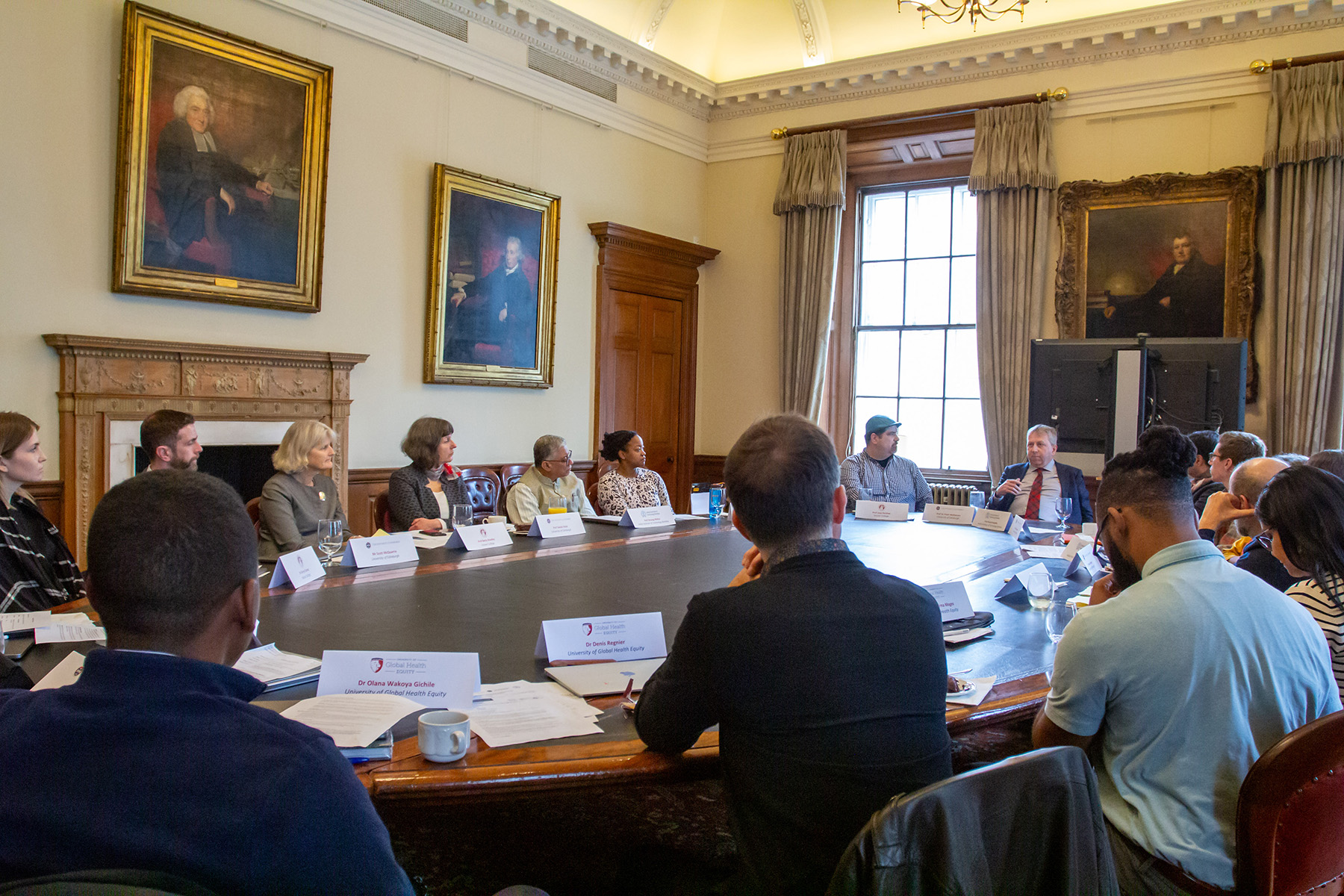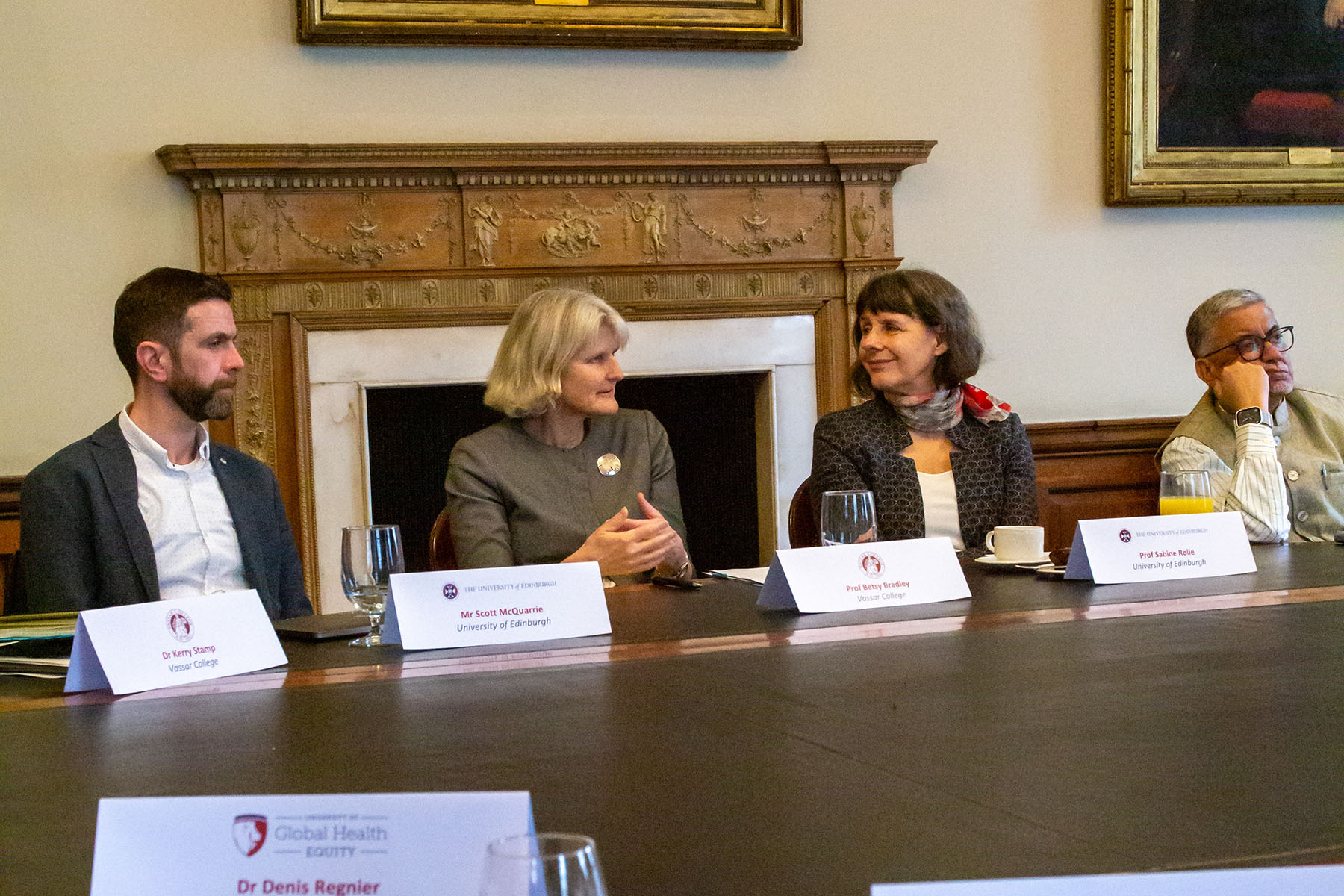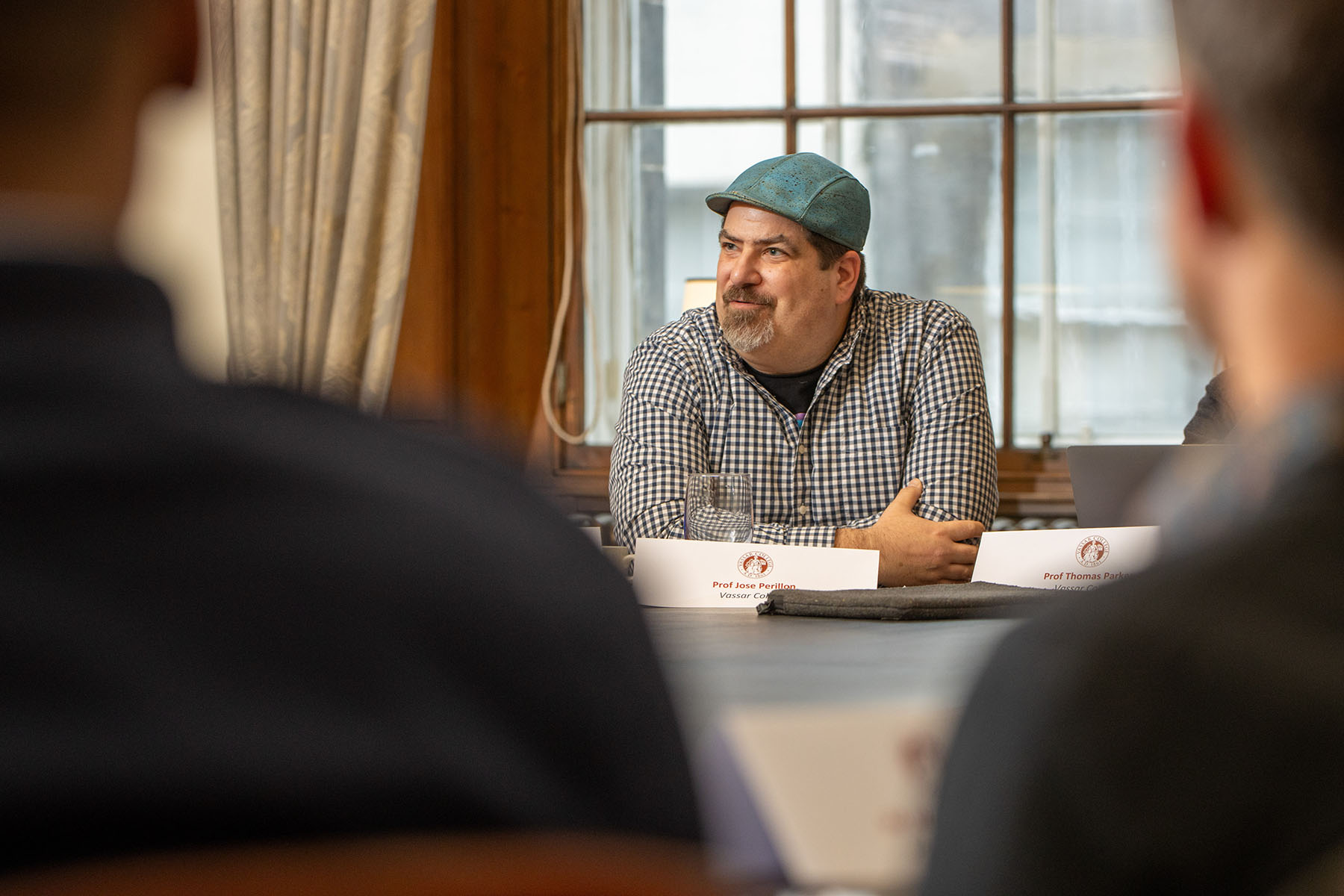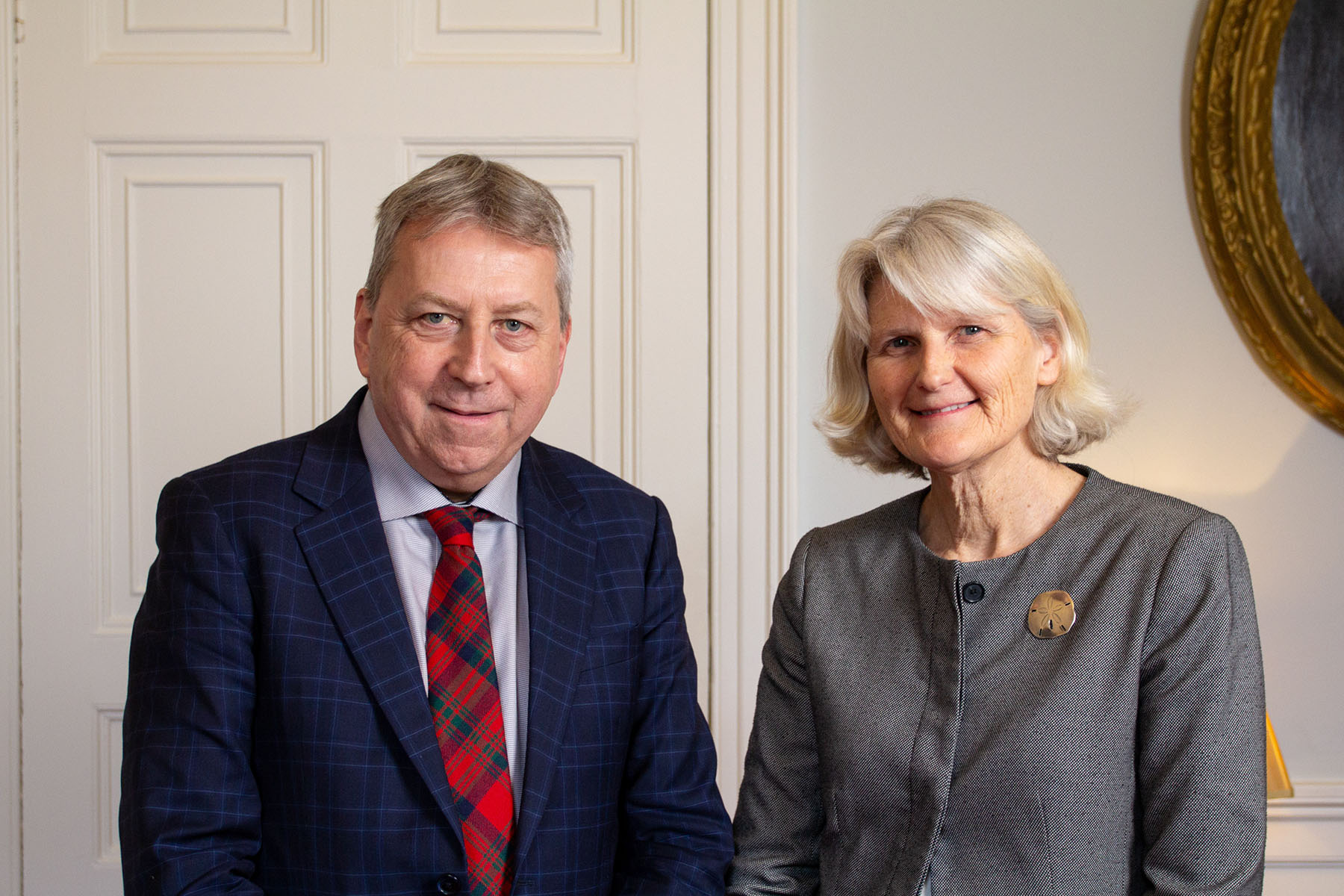Convening in Edinburgh, International Group of Education Leaders Collaborate on Liberal Arts Initiatives
In March, representatives of Vassar and three very different institutions situated on three continents convened on the campus of the revered University of Edinburgh in Scotland. The agenda of the two-day event was ambitious: finding ways to collaborate on initiatives incorporating the principles of the liberal arts at each of the four institutions—the 440-year-old University of Edinburgh; the six-year-old University of Global Health Equity (UGHE) in Rwanda; the Indian Institute of Technology Bombay (IIT Bombay), one of the most prestigious engineering schools in the world; and Vassar.
By the time the conference ended, all of the participants agreed they had found some common ground. Vassar President Elizabeth Bradley, who has been instrumental in bringing the four institutions together over the past few years, said she was optimistic that collaboration efforts would continue to grow and expand. “We talked about the ‘liberal arts’ as not just the material that is taught but also the methods used, including the pedagogy of student-driven learning and the culture of inclusion and equity and an openness to creativity,” Bradley said. “Our faculty has long been involved in international collaborations, and this initiative provides another avenue of collaboration that may involve institutional change [along] with the goal of enhancing liberal arts education globally.”

Less than a month after the conference ended, Vassar and UGHE had already launched an initiative at Vassar. Denis Regnier, Head of Humanities and Social Sciences at UGHE, and Associate Professor of French and Francophone Studies Thomas Parker created a two-week course in the Blue Humanities that makes connections between water, environment, and health issues in Rwanda. The six Vassar students (Julia Colón, Aza Wolfwood, Croix Horsley, Talia Yustein, Ambica Kale, and Sophia Henderson) enrolled in the course will travel to Rwanda this summer to work on water-and-health-related projects with 60 first-year students at UGHE.

“I teach environmental studies topics in addition to French,” Parker said, “and this new course is an outgrowth of the work I’ve done teaching terroir—the notion that a specific place has an effect on agriculture and local ways of life. Mapping the effect of water in Rwanda, instead of land, provides an exciting new area of inquiry that Professor Regnier, the students, and I will explore together.”
Parker’s collaboration with UGHE faculty and students is one of several planned by the two institutions over the next several months. Regnier and Bradley will teach a course at UGHE on critical thinking and scientific reasoning, Assistant Professor of Computer Science Prairie Goodwin will co-teach a course on health information systems, and Professor and Chair of Economics Sarah Pearlman will convene a class for first-year UGHE students on gender and social justice in collaboration with the team of the Center for Gender Equity at UGHE. “We expect students from Vassar and UGHE to both learn and benefit from the collaborations this summer,” said Bradley.
Regnier said UGHE faculty are eager to collaborate as well. “We are learning a lot from Vassar about liberal arts pedagogy,” he said. “We have a young faculty—for some it is their first teaching job—so pedagogical training is critical.”

Two other members of the Vassar faculty who attended the conference in Edinburgh—José Perillán, Associate Professor of Physics and the Pauline Newman Director of Science, Technology, and Society program, and Kelli Duncan, Professor of Biology—said they were intrigued by an idea for collaboration among all four schools triggered by a course currently offered at Edinburgh. The goal of the course is to address a major challenge facing many people around the world. Perillán and Duncan said representatives of all four institutions discussed the possibility of teaching such a course simultaneously and then re-convening to analyze their findings. “I can see all of us creating pilot initiatives at our respective institutions and then coming together to reflect and discuss what we learned,” Perillán said.
Duncan agreed. “Perhaps each of us could teach a slightly different aspect of the challenge,” she said. “I’m always interested in such multidisciplinary approaches to teaching.”
A member of the faculty at the Indian Institute of Technology said what he had learned at the two-day conference had convinced him that his university should remain involved in plans for further cooperation with the other three institutions. “IIT Bombay will actively pursue this collaboration,” said Dr. Anurag Mehra, Professor-in-Charge of the Center for Liberal Education, an arm of the university established in 2021. “Specific projects will evolve as we review the responses to our needs and the asks from other partners.”
Mehra said he envisioned exchange programs involving IIT Bombay students and faculty. “We hope to have both kinds of exchanges,” he said. “We are exploring what kind of financial support we can mobilize for these exchange activities.”

Edinburgh Professor Karen Gregory ’97 said she could envision several ways the four institutions could continue to work together to foster the liberal arts model. “We have a chance through the collaborative to build a robust and vital interdisciplinary network capable of reimagining the digital social sciences as a fundamental component of a liberal arts education,” Gregory said. “While data skills are much in demand, they fall flat without a robust sociological imagination capable of understanding and analyzing issues of power, inequality, and agency. These skills must also be developed through curriculums that have a commitment to fairness and equity among students. On both points, the need for a sociological imagination and a commitment to equity, I draw directly from the education I received at Vassar.”
Reflecting on what had been accomplished during and after the conference, Duncan said she was excited to see where the collaboration would lead next. “I didn’t go to a liberal arts college myself,” she said, “but I came to Vassar and saw the liberal arts approach to the sciences, and now we are all looking at how each institution can embrace the concepts of the liberal arts in their own ways.”
“The goal is to create better outcomes for students,” Duncan concluded, “and this meeting solidified for me why we are doing this.”